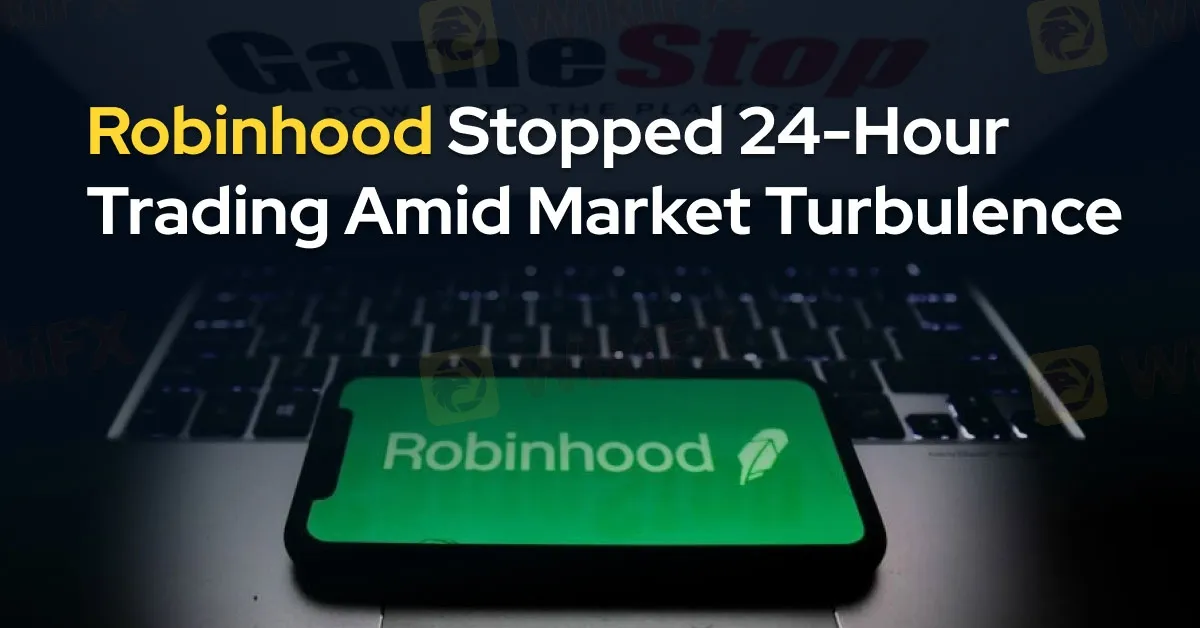简体中文
繁體中文
English
Pусский
日本語
ภาษาไทย
Tiếng Việt
Bahasa Indonesia
Español
हिन्दी
Filippiiniläinen
Français
Deutsch
Português
Türkçe
한국어
العربية
Robinhood Stopped 24-Hour Trading Amid Market Turbulence
Abstract:Robinhood announced the suspension of its 24-hour overnight trading service due to the severe market downturn on Monday, August 5.

Robinhood (NASDAQ:HOOD), a leading US neobroker, has announced the suspension of its 24-hour overnight trading service due to the severe market downturn on Monday, August 5. This service will be unavailable through Tuesday, August 6.
The market faced a steep decline on Monday, with the Dow Jones Industrial Average plummeting more than 1,000 points, a 2.6% drop. The broader S&P 500 and technology-heavy NASDAQ indices saw even sharper declines of 3.0% and 3.4%, respectively. Cryptocurrencies also took a hit, with Bitcoin and Ether prices dropping significantly.
In a statement on X (formerly Twitter), Robinhood explained that its overnight trading platform, Blue Ocean ATS (BOATs), would be offline for the night. Orders placed before approximately 8 PM ET will resume processing around 4 AM ET the following morning. Users can cancel their orders anytime and place new ones for the next trading session.

The market turmoil extended to Japan, where stocks experienced a dramatic 13% drop, the largest since the 2011 global financial crisis. This sharp sell-off led to circuit breakers being triggered across Asian exchanges. The Asia-Pacific index, excluding Japan, fell by 4.2%, while Japan's Nikkei 225 index hit a seven-month low.
In the United States, the negative trend continued with Nasdaq futures down 4.7% and S&P 500 futures plunging 12.4%. European markets were also affected, with EUROSTOXX 50 futures falling 2.1% and FTSE futures dropping 1.2%.
Investors turned to safer assets, causing both the yen and Swiss franc to strengthen. Japanese 10-year bond yields fell to 0.785%, the lowest since April, and U.S. Treasury yields also dropped significantly, with 10-year yields at 3.723% and two-year yields at 3.807%. This inversion of the yield curve is often seen as a recession indicator.
Following a disappointing July payrolls report, market expectations for Federal Reserve rate cuts have surged. Analysts now predict a 78% chance of a rate cut in September, with further reductions expected later in the year. Goldman Sachs has raised its recession probability to 25% under current conditions.
The U.S. dollar's appeal as a safe haven weakened, falling 0.4% against a basket of major currencies. It also declined against the yen and euro, while the Swiss franc appreciated. Gold prices climbed to $2,456 an ounce as investors sought refuge in precious metals.

Disclaimer:
The views in this article only represent the author's personal views, and do not constitute investment advice on this platform. This platform does not guarantee the accuracy, completeness and timeliness of the information in the article, and will not be liable for any loss caused by the use of or reliance on the information in the article.
Read more

Doo Financial Expands Regulatory Reach with Offshore Licenses in BVI and Cayman Islands
According to the report, Doo Group, a prominent Singapore-based online brokerage firm, has strengthened its global presence by securing new offshore licenses for its brokerage brand, Doo Financial. The company recently announced that entities under the Doo Financial umbrella have been granted licenses by two key offshore regulatory bodies: the British Virgin Islands Financial Services Commission (BVI FSC) and the Cayman Islands Monetary Authority (CIMA).

Russia to Fully Ban Crypto Mining in 10 Regions Starting January 1, 2025
Starting from January 1, 2025, Russia will implement a comprehensive ban on cryptocurrency mining in 10 regions for a period of six years. The ban will remain in effect until March 15, 2031.

The Hidden Checklist: Five Unconventional Steps to Vet Your Broker
Forex broker scams continue to evolve, employing new tactics to appear credible and mislead unsuspecting traders. Identifying these fraudulent schemes requires vigilance and strategies beyond the usual advice. Here are five effective methods to help traders assess the legitimacy of a forex broker and avoid potential pitfalls.

Doo Financial Obtains Licenses in BVI and Cayman Islands
Doo Financial, a subsidiary of Singapore-based Doo Group, has expanded its regulatory footprint by securing new offshore licenses from the British Virgin Islands Financial Services Commission (BVI FSC) and the Cayman Islands Monetary Authority (CIMA).
WikiFX Broker
Latest News
ASIC Sues Binance Australia Derivatives for Misclassifying Retail Clients
WikiFX Review: Is FxPro Reliable?
Malaysian-Thai Fraud Syndicate Dismantled, Millions in Losses Reported
Trading frauds topped the list of scams in India- Report Reveals
AIMS Broker Review
The Hidden Checklist: Five Unconventional Steps to Vet Your Broker
Russia to Fully Ban Crypto Mining in 10 Regions Starting January 1, 2025
YAMARKETS' Jingle Bells Christmas Offer!
Why is there so much exposure against PrimeX Capital?
Doo Financial Expands Regulatory Reach with Offshore Licenses in BVI and Cayman Islands
Currency Calculator


